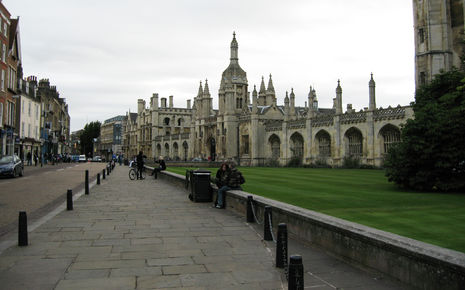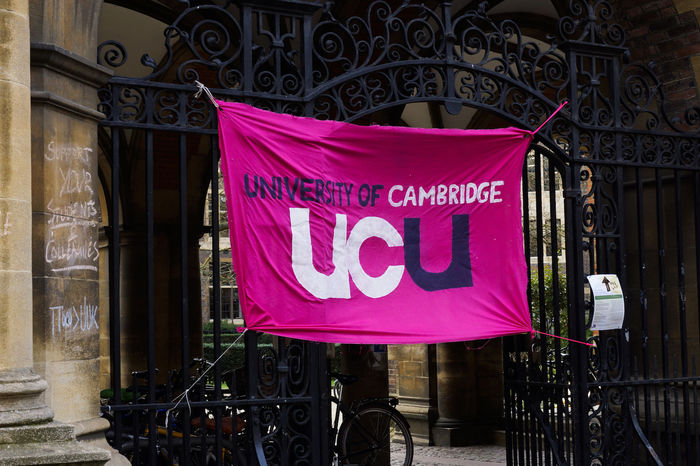BAME staff at Cambridge are paid 2.9% less than their white colleagues, investigation finds
The SU said that the university isn’t doing enough to address its ethnicity pay gap, accusing universities of continuing to support ‘oppressive systems created during the colonial era’

Black, Asian and Minority Ethnic (BAME) staff at the University of Cambridge are on average paid 2.9% less than white members of staff, an investigation by the Daily Mail has revealed.
The report found that two-thirds of Russell Group universities have paid BAME staff less than their white peers.
King’s College London had the highest overall gap (19.1%). The University of York was also found to have paid Black women 41% less than white men in the last recorded year — this means that for every £1 a white man earned, a Black woman received just 59p.
SU Postgrad President Amelia Jabry and BME Officer Kefeshe Bernard released a joint statement to Varsity responding to the Mail investigation, calling Cambridge’s pay gap “a devastating reality of the world we live in” and accused universities of continuing to “support oppressive systems created during the colonial era.”
Jabry and Bernard continued: “Melanated bodies, minds and culture have been chronically undermined, undervalued and actively suffocated for centuries… Cambridge University often tries to address these problems by creating committees, seeking membership from already time-pressured black academics and students, while not actually taking actionable steps to address this issue.”
Moving forward, the SU says that universities “need to be actively anti-racist and actively seek complete and true decolonisation.”
The Mail’s findings come at the same time as the release of a paper by BERA into staff equality in UK higher education, which came out last week. The report found that education departments tend to be less racially diverse and older than other disciplines.
Another concern highlighted by the report was that BAME staff were much more likely to cite resignation as a reason for leaving the sector of higher education than their white colleagues. Additionally, recent increases in ethnic minority staff were found to be mainly limited to a junior level.
The lack of diversity and pay gaps in higher education institutions has caused concern. Dina Belluigi, the principal investigator on the BERA report has spoken of the need for equality among education departments, saying: “Higher education has such a big role in terms of the sustainable development goals that inequalities within the discipline at a higher education level has really big ramifications for the UK’s role in addressing global inequalities.”
However, the usefulness of ethnicity pay gaps as a measure of equality within workplaces has been challenged, with some arguing that gaps are not about BAME members of staff being paid less than their white colleagues, but more about the low number of BAME individuals in senior roles.
Back in May 2022, the UK government pushed back against a proposal by the House of Commons Women and Equalities Committee to make ethnicity pay gap reporting mandatory for companies with over 250 employees. The government said then in a statement that ethnicity pay gap reporting “may not be the most appropriate tool for every type of employer seeking to ensure fairness in the workplace.”
A spokesperson from Cambridge University claimed that the pay gap illustrated by the Mail’s analysis is flawed, given that it is “based on the difference in average pay across the workforce, rather than the difference in like-for-like roles”.
They continued: “The University is committed to equality of opportunity, and although this year we saw a reduction in the ethnic pay gap, there is more work to be done in addressing the root cause of the pay gap and creating a culture where all can thrive.”
“The University is committed to equality of opportunity, and although the most recently published figures show a reduction in the ethnic pay gap there is more work to be done in addressing the root cause of the pay gap and creating a culture where all can thrive.”
“The University continues to work on ways to eliminate the gap, including attracting, recruiting and welcoming a more diverse workforce, and enhancing career development.”
A spokesperson from Cambridge University claimed that the pay gap illustrated by the Mail’s analysis is flawed, given that it is “based on the difference in average pay across the workforce, rather than the difference in like-for-like roles”.
They continued: “The University is committed to equality of opportunity, and although the most recently published figures show a reduction in the ethnic pay gap there is more work to be done in addressing the root cause of the pay gap and creating a culture where all can thrive.”
“The University continues to work on ways to eliminate the gap, including attracting, recruiting and welcoming a more diverse workforce, and enhancing career development.”
The General Secretary of UCU Jo Grady said that universities should “hang their heads in shame” after hearing the ethnicity pay gaps illustrated by the Mail investigation. “We need universities to sit down with their local union branches to agree action plans to address this disgrace”, Grady added.
The University and College Union has been involved in campaigning on the ethnicity pay gap within universities. Each year, they organise a week of action against workplace racism, with pay gaps being a key focus.
 News / University Council rescinds University Centre membership20 February 2026
News / University Council rescinds University Centre membership20 February 2026 News / Hundreds of Cambridge academics demand vote on fate of vet course20 February 2026
News / Hundreds of Cambridge academics demand vote on fate of vet course20 February 2026 News / Judge Business School advisor resigns over Epstein and Andrew links18 February 2026
News / Judge Business School advisor resigns over Epstein and Andrew links18 February 2026 News / Caius students fail to pass Pride flag proposal20 February 2026
News / Caius students fail to pass Pride flag proposal20 February 2026 News / Union cancels event with Sri Lankan politician after Tamil societies express ‘profound outrage’20 February 2026
News / Union cancels event with Sri Lankan politician after Tamil societies express ‘profound outrage’20 February 2026










